Yes, Christians Worship Saints, Crosses, & Holy Things - Here's Why
Yes, Christians Worship Saints, Crosses, & Holy Things - Here's WhyEven Protestants, Catholics, & Orthodox Christians do it...In addition to worshiping God, all Christians worship things which are not God, such as parents, friends, authorities, Saints, icons, Bibles, crosses, and holy places. This is almost universal, and it is not idolatry. For some reason, most of them claim that they don't do this. We will take a look at some of the reasons why. But first, let's look at a few examples. Liturgical Books As an Orthodox Christian priest, every Sunday morning I kiss an icon of Christ (a painting of Him), while praying the following prayer:
This prayer is printed in a mainstream, widely-distributed liturgy book which has been in print for many decades, most recently published in 2022, by one of the best known and most highly respected Orthodox Christian publishers: Holy Trinity Monastery of Jordanville, New York. 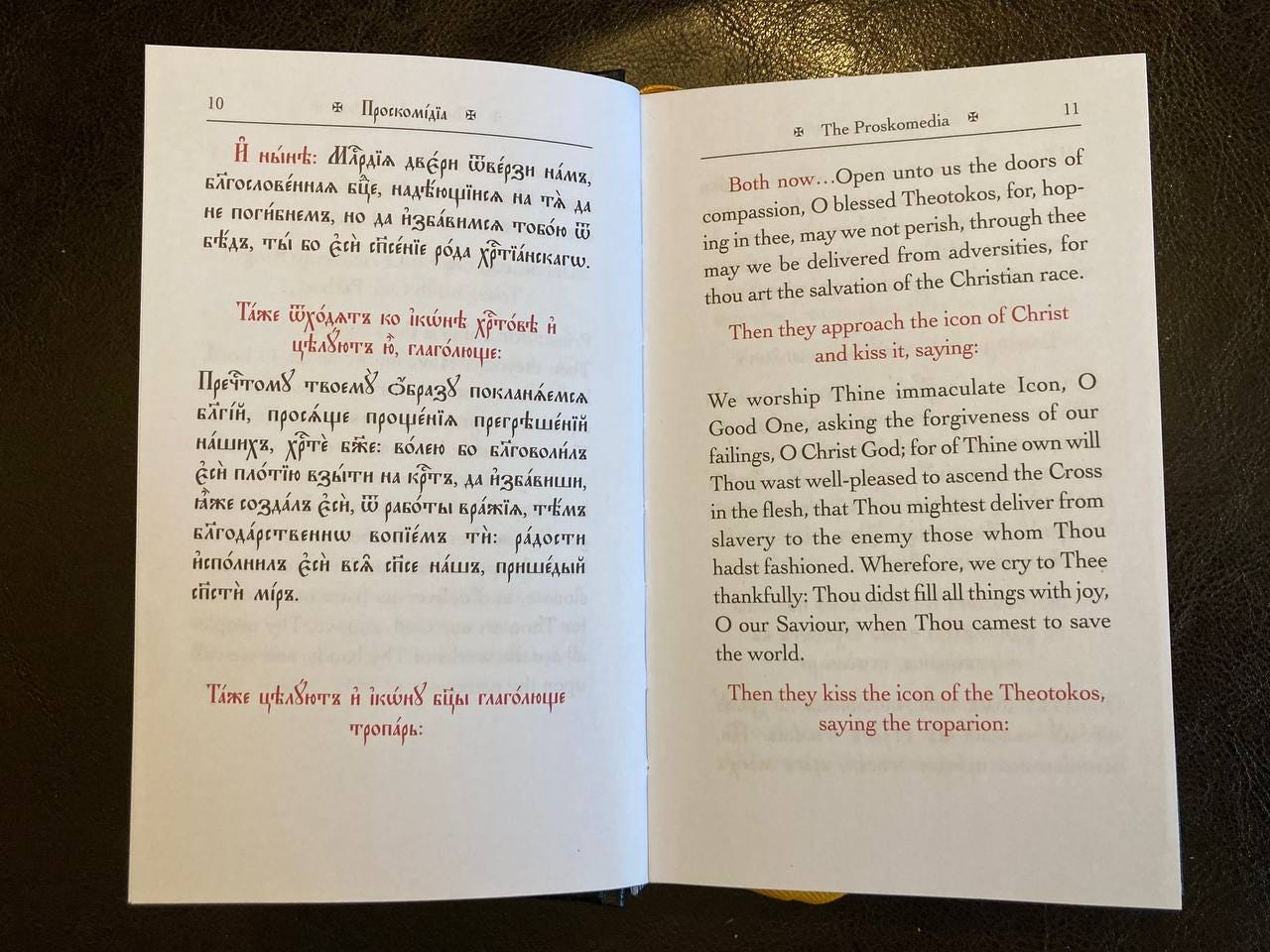 This is a common prayer, frequently encountered. It is one of the "Entrance Prayers", which I am required to pray every Sunday morning before entering the altar area. If I don't pray this prayer, then I can't even lead the service on Sunday. Later in the same book, we encounter another prayer, where "We worship Thy Cross, O Christ", and where we "worship Christ's holy Resurrection". This is one of the prayers of the Divine Liturgy, the regular Sunday morning service observed in Orthodox Churches around the world. It is also sung by Orthodox Christians every week, during the Saturday evening vigil. The same prayer is frequently prayed by Orthodox Christians each morning during "Bright Week", the week following Pascha (Easter). The Holy Trinity Monastery has published a very popular prayer book which includes these prayers, specifically worshiping the Cross of Christ, as well as His Resurrection: And just prior to celebrating Pascha (Easter), in the Lamentations service during Holy Week, Orthodox Christian choirs also sing the following verse, in honor and reverence for the suffering that Christ willingly endured on the cross:
Wycliffe's Bible The modern word "worship" comes from the Old English word “weorthscipe” and the Middle English word "worschip", which simply mean “worthy of honor, respect, or dignity.” To worship is to ascribe honor, worth, or excellence to someone, whether human or divine. In Scripture, the term “worship” frequently carries this meaning. “Wycliffe’s Bible” is the first known complete translation of the New Testament into English. The author, John Wycliffe, is beloved by Protestants, and they frequently refer to him as "The Morning Star of the Reformation". Throughout his translation of the New Testament, he makes it clear that worship is not for God alone. According to Scripture, we are also supposed to worship our father, our mother, and other godly people. And if we live our lives in obedience to Christ, then God will worship us. When John Wycliffe rendered Matthew’s Gospel into English, he translated Christ’s words in Matthew 19:19 like this: “Worschip thi fadir and thi modir.” With modern English spellings, that would read, “Worship thy father and thy mother.” Of course, when Jesus said this, He was not telling people to idolize their parents. Rather, Jesus was simply reminding us of God’s command to honor our parents. “Honor” is “Worship”. They mean the same thing. Wycliffe translates Luke 14:10 to say, “But when thou art bidden to a feast, go, and sit down in the last place, that when he cometh, that bade thee to the feast, he say to thee, 'Friend, come higher.' Then worship shall be to thee, before men that sit [with thee]...” And in John 12:26, Wycliffe translates the words of Jesus like this: “If any man serve me, my Father shall worship him.” There are many other instances where this first English New Testament uses the word “worship” in similar ways. The Great Bible The first English translation of the entire Bible, also known as the "Great Bible", was put together by Miles Coverdale in 1535. Published a full 76 years before the King James Version (KJV) came into existence, royal decree placed a copy of the Great Bible in every parish church throughout England. The KJV eventually eclipsed the Great Bible in popularity. However, one section of the Great Bible—the Psalms—continued to carry spiritual and literary influence for the next several hundred years, even into the present. Throughout the centuries, most versions of the English Book of Common Prayer have included the Psalms from the Miles Coverdale translation, not from the KJV. Even in the Orthodox Church, there are some Western Rite parishes which currently use this version of the Psalms. The Miles Coverdale version of the Psalms "is a translation that since the sixteenth century has occupied a central position in both the private devotions and public liturgies of the English-speaking people", as William Peterson has aptly noted. This copy of the Psalms has greatly contributed to the history of the English language, and for five hundred years it has continued to be influential. In the following passages from this copy of the Psalms, consider who is receiving worship:
In these three Scripture verses, we do not see man worshipping God. Rather, we see God giving worship to man. In Psalm 8:5, God crowns man “with glory and worship”. In Psalm 21:5, God lays “glory and great worship” upon David, the King of Israel. And Psalm 84:12 explicitly says that God “will give grace and worship” to those who live a godly life. Obviously, God is not an idolater. These Scripture passages make sense because “worship” is “honor”. These two words mean the same thing. Traditional English Wedding Ceremony Another interesting resource is the traditional English wedding ceremony that has been used in England and America for hundreds of years. Most of us are familiar with popular phrases from this ceremony, such as:
Here is another part of the same wedding service:
When English Protestants wrote this wedding service, they were not contemplating open idolatry. These Anglicans were not telling one spouse to worship another, as one would worship a god. Rather, they were simply advocating honor and respect, which are important aspects of any healthy marriage. Bowing Down is Not Idolatry It is well known that the Old Testament was written in Hebrew, rather than English. The Hebrew word most commonly translated as “worship” is שחה, which is pronounced “shachah” when transliterated into English. This word “shachah” literally means “to bow down” before someone. There are many places in the Bible where it is clearly used in reference to the worship of God. For example:
In the first two verses, the Hebrew word “shachah” is translated as the English word “worship”. In the third verse, the word is translated as “fall down”. These passages convey the idea of a person bowing down in reverence and honor. Obviously, bowing down before false gods is prohibited. Giving them any honor at all is off limits. But what about bowing down before kings, parents, and loved-ones? If a Christian bows down to another person under such circumstances, is that considered idolatry? Or does Scripture consider such activity to be an appropriate display of love, honor, and respect? As Scripture reveals, some of the holiest people in history bowed down before other people. To show their love, honor, and respect, they bowed down before them. And to describe what is happening, the Hebrew Scriptures use the word “shachah”, the very same word that is elsewhere translated as the “worship” of God. As you read the following passages, you will see godly people like Abraham, Isaac, Jacob, Joseph, Moses, David, Abigail, Solomon, and Elisha engaged in “shachah”. Sometimes they bowed down to other people, and sometimes other people bowed down to them:
Without exception, all 22 Scripture passages use the Hebrew word “shachah” to describe the honor and respect being showed. When this word is translated into English, it is variously translated as “worshipped”, “fell down”, “bowed”, “bowed down”, “did obeisance”, and “did reverence”. And regardless of how this word is translated into English, it still carries the same meaning. To worship someone is to give them honor and reverence. According to Scriptural usage, the words “worship” and “reverence” are synonyms. The worship of false gods is prohibited, for the same reason that giving honor and reverence to false gods is prohibited. False gods are idols, and it is not appropriate to give them any honor or respect. But offering reverence to King David or to the Prophet Elisha is another thing altogether. Unlike false gods, David and Elisha are fitting recipients of our honor and respect. It is appropriate to give reverence to holy people who faithfully follow God. That is why Scripture makes a distinction between worship that is offered to idols, and worship that is offered to God’s faithful followers. The first is condemned as idolatry. The second is not condemned at all. In Revelation 22 and Revelation 19, the apostle John is told not to bow down before angels, so one must be careful not to go overboard. Bowing down before others is not always appropriate. Still, the number of Scripture passages which present bowing in a positive light, far outnumber those which present it negatively. There is a notable place in Scripture where the worship of God and the worship of man occurs simultaneously, within the same passage, using a single instance of the Hebrew word “shachah”:
King David is well-known as the “man after God’s own heart” (Acts 13:22). And in the passage quoted above, he leads the entire congregation in worshiping God. In response to his godly leadership, Scripture says that all the people bowed their heads, and worshiped both the Lord and the king. They worshipped God, and they also worshipped David. Thus King David was not only a giver of worship (to God); he was also a willing recipient of worship (from the people). Whether we use the word “worship”, or whether we use terms such as “homage”, “bowed”, “knelt”, or “obeisance”, we are still saying the same thing. And regardless of which word we use, we need to remember that the underlying Hebrew word is still “shachah” — the same word used in Scripture for the worship of God. The Old Testament was written mostly in Hebrew. But by the time of Christ, Greek was the primary language of the Empire. A couple hundred years before Christ, a group of approximately 70 Jewish scholars translated the Scriptures from Hebrew into Greek. This translation was called the “Septuagint”, which means “Seventy”. The Septuagint Scriptures are what Jesus and the apostles heard and read their entire lives. From the time they were children, the Septuagint shaped their understanding of how the Greek language is spoken in the context of worship. In the New Testament, Jesus and the apostles quoted from the Old Testament hundreds of times. And virtually every time, they quoted directly from the Septuagint. As we saw earlier, the Hebrew word “shachah” is the Old Testament word for “worship”. In virtually every case, the Septuagint translates “shachah” as “προσκυνέω” (proskyneō), which is the Greek word for “worship”. Thus for Jesus and the apostles, reading the Scriptures in Greek was no different than reading the Scriptures in Hebrew. In both languages, they read about Abraham worshiping the inhabitants of Heth, Jacob worshiping Esau, the Israelite Patriarchs worshiping Joseph, Abigail worshiping King David, King Solomon worshiping his queen mother, and the prophets worshiping Elisha. And throughout the New Testament, Jesus and the apostles used this same Greek word, whenever they wanted to talk about worship. How Do We Avoid Idolatry? On a popular traditional Orthodox website, and also on a local Orthodox church website in the midwestern United States, the following statement is made concerning worship. Some of the text is bold here for added emphasis:
Famous for writing books attacking Roman Catholicism, John Terry was a member of the clergy in the Church of England in the early 17th century. In his book titled Theological Logic, this Protestant minister made a helpful statement regarding the proper boundaries of worship:
Christians are supposed to treat everyone with love and charity. But we are commanded to shun pagan gods. In Scripture, idol worshipers are those who "serve" false gods. They openly call them "gods", and they perform various forms of religious service for these gods. In ancient times, this often took the form of animal sacrifice. Today, other forms of pagan worship are more common. For example, a Hindu believer might burn a candle in honor of some false god, and then put some of the candle wax on her forehead, as a testimony that she is a servant of that particular god. This is idolatry — not because there is anything wrong with candles or prayer, but because the person is serving a demon that poses as a pagan god. It is one thing to give honor and respect to someone who is honorable. It is quite a different thing to give honor and respect to false gods. No Christian is offended when the New Testament honors a long list of faithful OT Christians in the 11th chapter of Hebrews. Giving the Saints this sort of worship and honor is perfectly acceptable. But the moment we give love and honor to Baal, Ashtoreth, or Molech, or to any member of the Hindu pantheon, we are giving reverence to demons, and thus we become guilty of idolatry. God gives love, honor, and worship to those who please Him. He honors those who faithfully follow Him. But He never honors demons who pose as substitues for Him. As followers of Christ, we should respond in similar ways:
Love, honor, worship, and reverence do not constitute idolatry, unless they are directed towards a pagan god. You can love your spouse, and that is not idolatry, unless you believe your spouse is a god. You can honor your parents, and that is not idolatry, unless you consider your parents to be gods. You can worship the Scriptures, the cross, or a holy icon, and that is not idolatry, unless you actually consider those items to be gods. You can show reverence to your religious leaders, and that is not idolatry, unless you consider them to be gods. Why Do Some Modern People Use the Word "Worship" Differently? In ancient times, there was a clear distinction between worship that is given to holy people, and religious service that is given to God alone. Holy men and women in the Old Testament would often give appropriate levels of worship to one another. But they would never offer an animal sacrifice to a human being. Bowing to one another is good and acceptable. Offering a sacrifice is for God alone. After the coming of Christ, animal sacrifices were replaced by the Eucharist — the Body and Blood of Christ — which is offered by the priest at every Sunday morning service. This offering is never made to any angel or saint — it is offered to God alone. At every Orthodox Christian liturgy on every Sunday morning, the priest holds the Eucharist high above the altar and calls out to God, "Thine own of Thine own, we offer unto Thee, on behalf of all and for all." This
practice continued for more than one thousand years, before Protestants
appeared on the scene and made significant changes to Christian
worship, redefining the Eucharist as being merely symbolic, and in many
cases removing the Eucharist altogether from the normal weekly service. Unfortunately, a number of modern Orthodox Christians (and also Roman Catholics) have adopted this Protestant change to the English language, and have been tricked into thinking that worship is for God alone. As a result, they often write articles, desperately attempting to explain why kissing icons, bowing, and honoring saints is something other than "worship". But that approach is a mistake, causing confusion for multiple reasons:
We should never worship false gods. — We should worship God, and we should worship those who worship Him. | ||
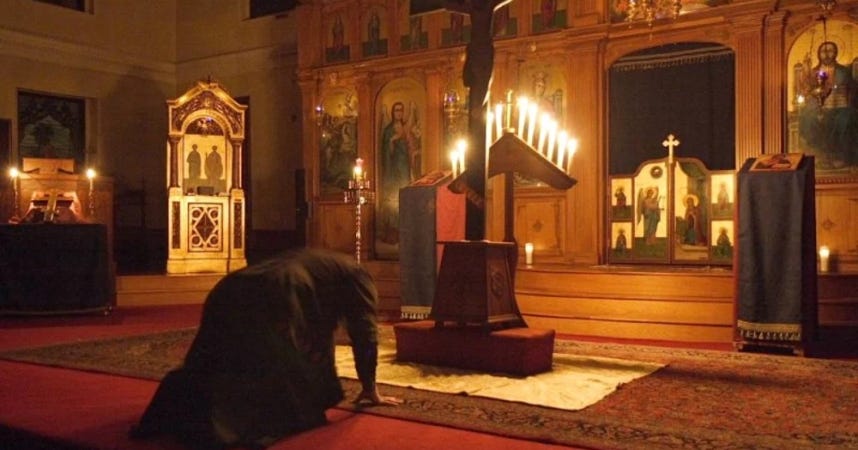
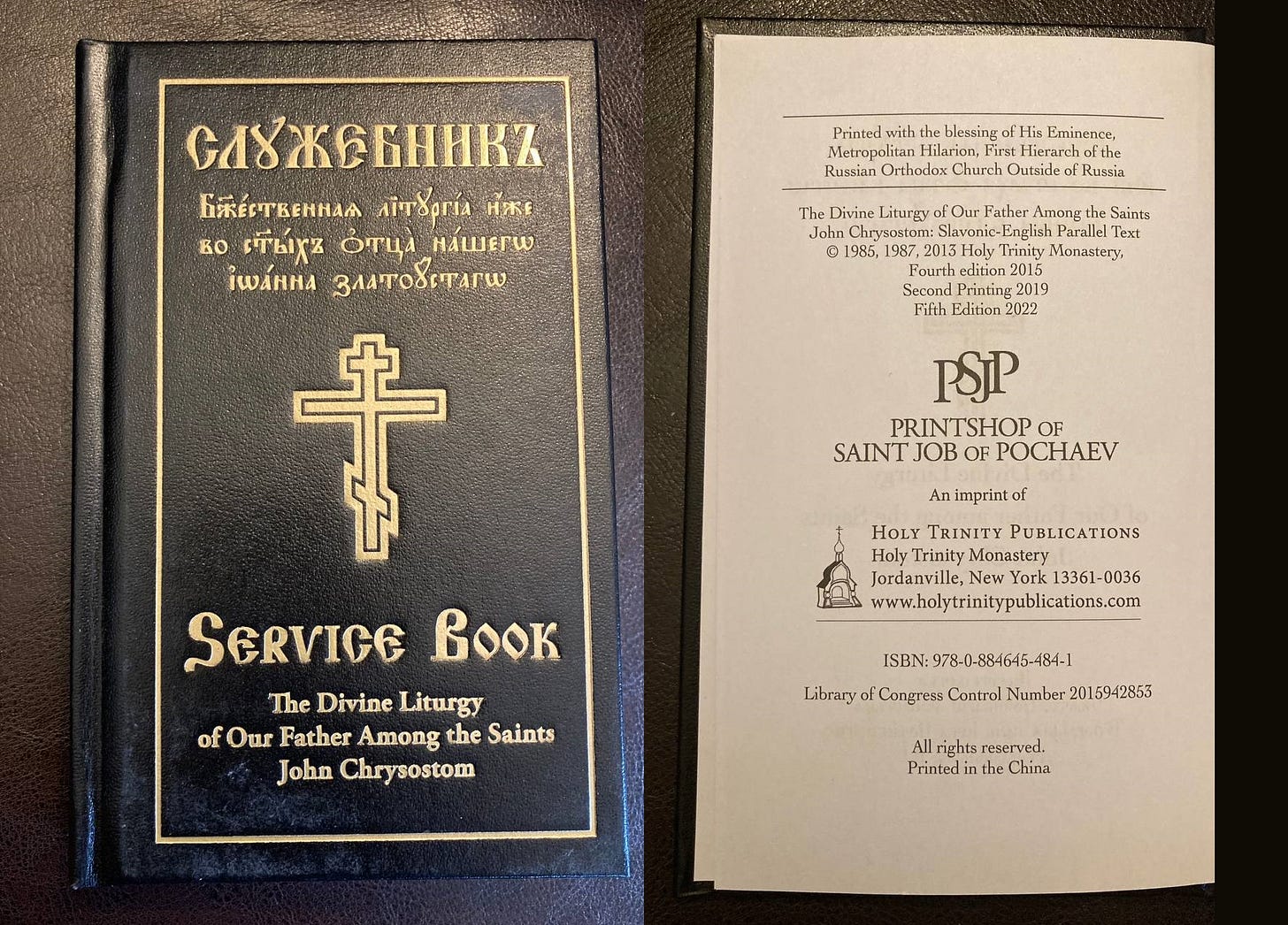
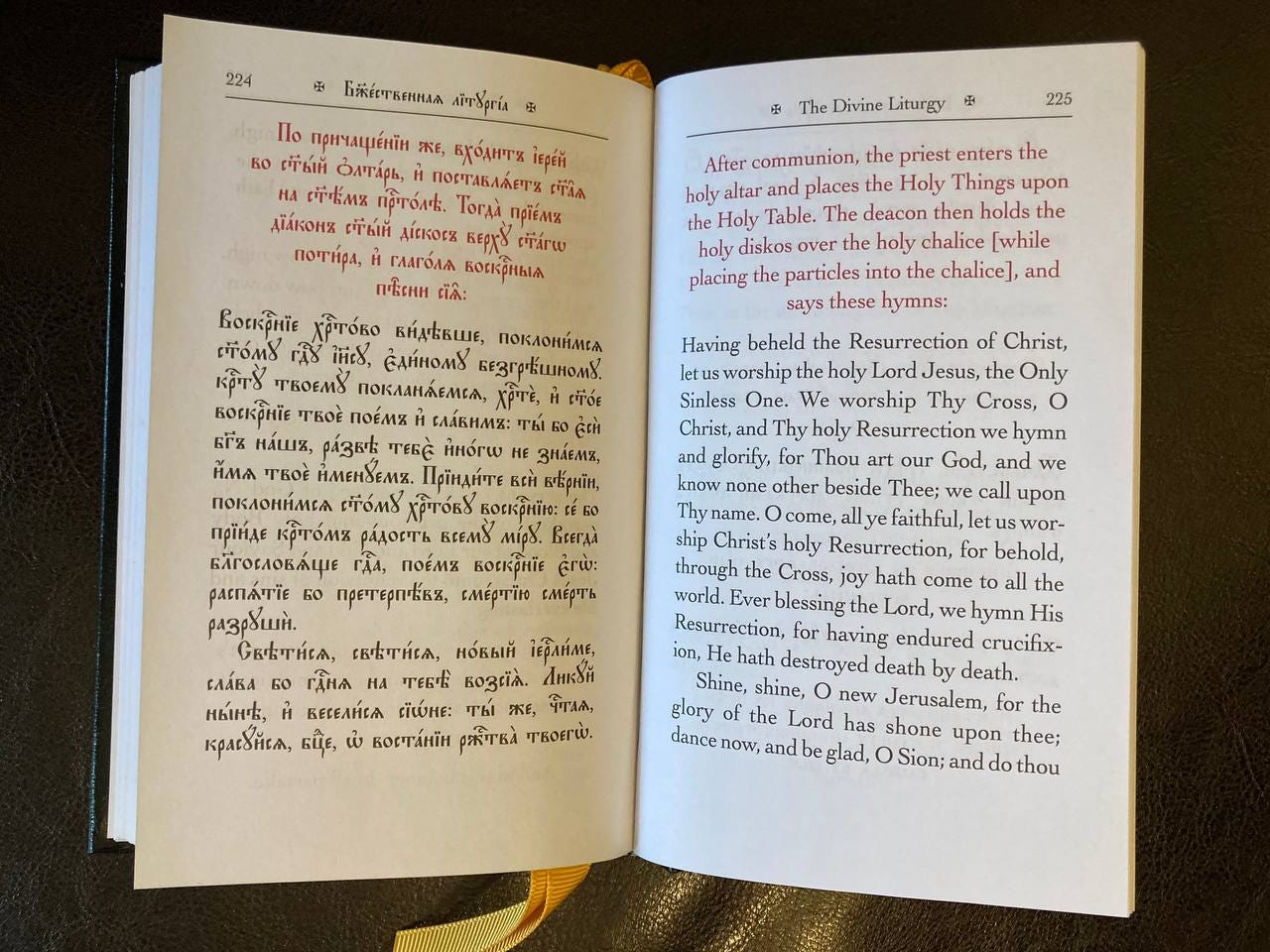
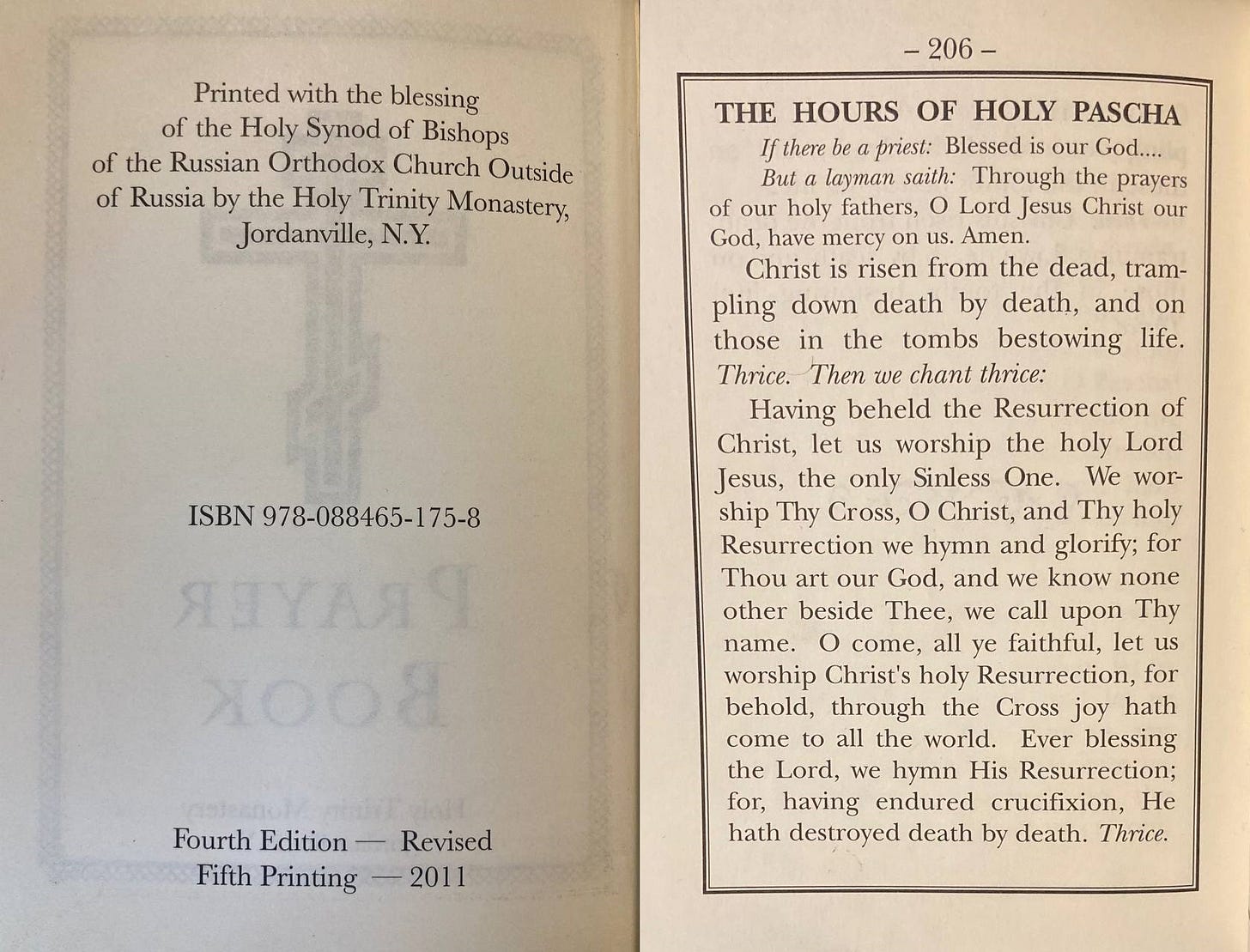

Comments
Post a Comment